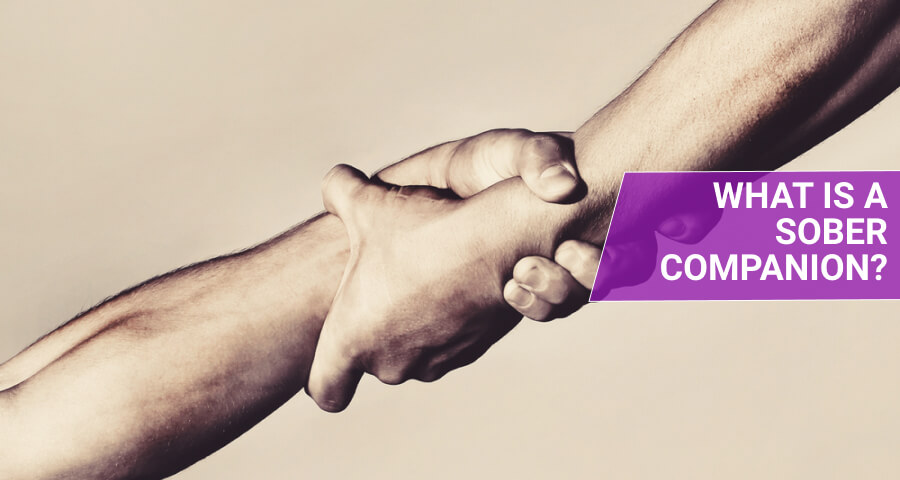
Time spent in a rehabilitation center is critical for an addict trying to recover from addiction, whether that was to illicit drugs or alcohol. A sober companion may be advised to accompany these individuals when pink cloud sobriety ends and they are returning home from the rehab. The National Institute on Drug Abuse found that between 40% and 60% of patients admitted to a drug rehab will relapse after they are released. Read further to know the role of personal companions during recovery and aftercare and how they can reduce the risk of relapse.
Table Of Contents:
Who Is A Sober Coach?
A sober companion may sometimes also be referred to in different ways. Whether talking about a sober companion, a sober coach, or even a recovery coach, these are individuals that will accompany a person on their journey toward continued sobriety and recovery after completing a residential program in a rehabilitation center.

For many people, the idea of leaving the rehabilitation facility and entering an environment that can be enabling their addiction and getting treatment can be frightening. This is especially a concern when the person will be surrounded by others who might drink alcohol or use illicit drugs. The idea of a recovery coach is to provide the patient with the support they need to ensure they keep on the path of sobriety during their treatment.
Who Needs Recovery Coaching?
It is not uncommon to find a recovering patient paired with a sobriety coach. Addiction psychiatrists and other medical practitioners and staff can often recommend a person to be paired with a sober coach.
In other instances, a person may need a sober companion rather than family due to the presence of a mental health disorder that is hard to deal with. Many drug addicts develop mental health disorders during drug use. The absence of an individual to monitor these patients can lead them to harm themselves.
That said, patients who find themselves feeling scared, sad, and restless should seek out the services of a recovery coach.
Sober Companion Services
A sober companion can offer companionship for recent and even long-time patients. A recovery coach spends time with the patient, helping make significant life events and daily tasks easier for patients with mental health and behavioral challenges.
These professionals also help teach their patients to be more productive and function as regular members of society and family. Lastly, a sober companion acts as a “moral compass,” helping clients maintain sobriety. Sober companions provide assistance spending time with the patient, preventing them from being triggered by anything in their social life. There are also on-call sober companions that answer the patients’ calls when they feel bad.
Sober companions cannot prescribe medications and provide conventional treatment for patients, but they are available to help fight addiction at any time.
The National Alliance on Mental Illness explains that an estimated 50% of those who have a mental illness like depression will turn to certain types of substances, including drugs and alcohol, at some point. Thus, many individuals who are recovering from an addiction will likely also experience signs of depression and other mental illnesses. The sobriety coach that may be assigned to the individual will also often assist with these problems. They will offer the person someone to talk to when needed. They will also provide a support system that may be useful for the individual to recover successfully and to manage depression, anxiety, and related symptoms effectively.
Differences Between A Sober Escort & Companion
When looking to have someone accompany a patient on their way home and support them during the initial months after they have gone through a rehabilitation program, it is essential to note that several types of treatments are offered. Sobriety escorts and sobriety coaches are terms often used in this context, but these are not the same professionals. It should, however, be noted that there are cases where a sober companion may act as an escort as well.
Sober Escort
An abstinent escort is commonly used by patients who have completed a comprehensive rehab program and don’t know how to handle it all. They are the medical professionals responsible for getting outpatients to their treatment appointments with therapists, medical doctors, and support groups to maintain their sobriety.

They provide doorstep pickup services for one or more clients. If the client exhibits any difficulties during their transport, a sober coach takes charge of the situation and puts the patient at ease.
Additionally, this version of a recovery coach is responsible for carrying patients across far distances like across town, across the country, and so on.
Sober Companion
Simply put, it is someone patients hire for emotional support during detox and rehab programs. More often than not, a peer recovery coach gets involved in their clients’ social situations and activities daily. A sobriety coach may choose to live with the patient. When they live with their patient, they will most likely accompany the person everywhere and all the time. Other sobriety coaches are available 24/7 on the phone, helping patients manage cravings, withdrawal symptoms, and anxiety from their treatments.
It is easy to mistake them for a personal assistant or a social worker, but they are not. Instead, the task of a peer recovery coach is to support their clients’ endeavors to reintegrate themselves into society.
Recovery Coach
Recovery coaching is a demanding and collaborative type of service. A recovery coach is someone who offers directional and motivational treatments, advice, and support for one or more clients. These professionals are not focused on diagnosing a patient. Instead, their primary focus is on offering tools and guidance for patients who need them.
Additionally, a sobriety coach provides constant contact, support, resources, and accountability for patients trying to reintegrate into society. After a patient has made progress in their abstinence journey, they would help review and educate their patients on how much their decision has changed their life’s course.
Sober Companion Prices
Sobriety coach prices vary quite a lot, as several factors need to be taken into account when the services of such a person are utilized. In most cases, sobriety coach costs will be based on a day-to-day basis. They will depend on whether the professional needs to reside with the patient or only provide constant contact, resources, and support during the day.
Sober coach services will usually range from $750 up to $1000 per day. However, there are cases where these professional companions may charge as much as $1900 for each contact. In these cases, the patient may be more demanding, and the individual may be more experienced.
What To Expect From A Sober Companion?
Utilizing coaching services places a stranger into the patient’s home while they are recovering. It is important to note that these professionals are trained and have specific functions that they will serve at the recovering addict’s residence. There are, however, different types of companions. For example, a 12-step companion may take advantage of a more traditional approach to recovery. On the other hand, some companions may instead take a more holistic approach and introduce the patient to acupuncture, therapeutic musical sessions or adventure therapy program, and other techniques that can help them steer clear of relapse.
The companion will ensure any alcohol and drugs are removed from the place where the recovering addict will reside after being released from the rehabilitation facility. The buddy will also ensure they take note of any behaviors that may indicate a relapse or an urge to go back to old habits. They can also help prepare a relapse prevention planning worksheet. At the same time, they support the individual during the aftercare period.

Additionally, the sobriety coach will also ensure that the patient remains on the path set out for them by the psychologists and other care providers who looked after them while in the rehab. These professionals are also responsible for ensuring that the person undergoing recovery does not associate with people who may have a bad influence on them. They will assist with recovering bonds with loved ones, including family members.
Staying On the Path Of Recovery
Many people who frequently consume drugs tend to undermine their addiction. However, if they take a close look at their lives and how their work, relationships, and health are suffering, they would quickly realize that drug consumption is the cause of these struggles.
Recovery patients who don’t know how to go about their business without drugs are strongly advised to seek the services of a sobriety coach.
That said, if you’re suffering due to withdrawal symptoms, or you’re an addict that doesn’t know how to quit, the best thing to do would be to get help before it leads you to develop health complications and difficulties with completing tasks and keeping healthy relationships.
Hope Without Commitment
Find the best treatment options. Call our free and confidential helpline
Most private insurances accepted
Find Drug Rehabilitation Centers Near You Anywhere In the US
Addiction Resource team has compiled an extensive list of the top drug rehabilitation facilities around the country. Use our locator tool to find the best centers near you.
Page Sources
- Balasubramanian, K., & Gala, N. Virtual Sober Companion-Mood Analysis. https://www.academia.edu/download/47615189/V050201660173.pdf
- White, C. M., Browne, T., & Nafziger, A. N. (2021). Inherent Dangers of Using Non–US Food and Drug Administration–Approved Substances of Abuse. The Journal of Clinical Pharmacology, 61, S129-S141. https://accp1.onlinelibrary.wiley.com/doi/abs/10.1002/jcph.1860
- Järvinen, M., & Østergaard, J. (2011). Dangers and pleasures: Drug attitudes and experiences among young people. Acta sociologica, 54(4), 333-350. https://journals.sagepub.com/doi/abs/10.1177/0001699311422018


 Reviewed by:
Reviewed by:  Written by:
Written by: 












 FindTreatment.gov
FindTreatment.gov